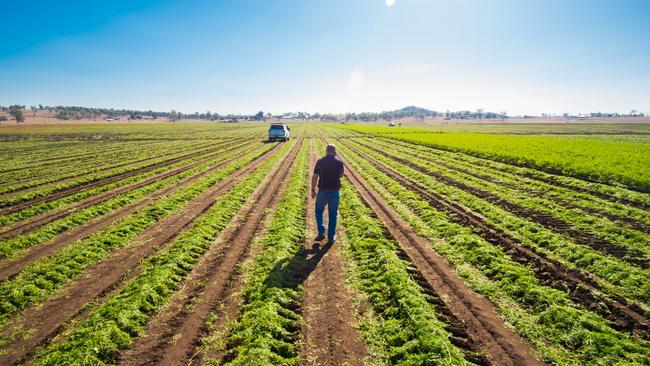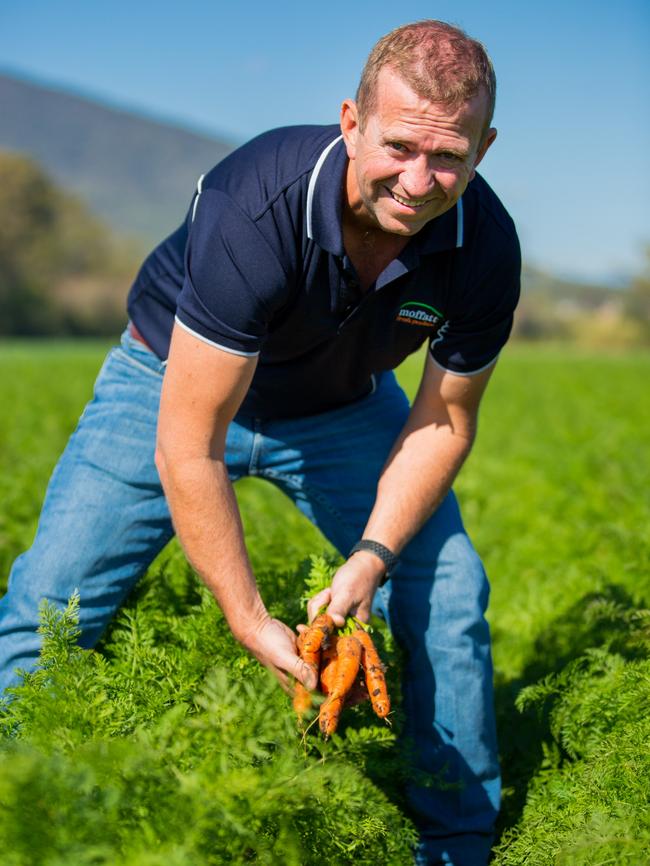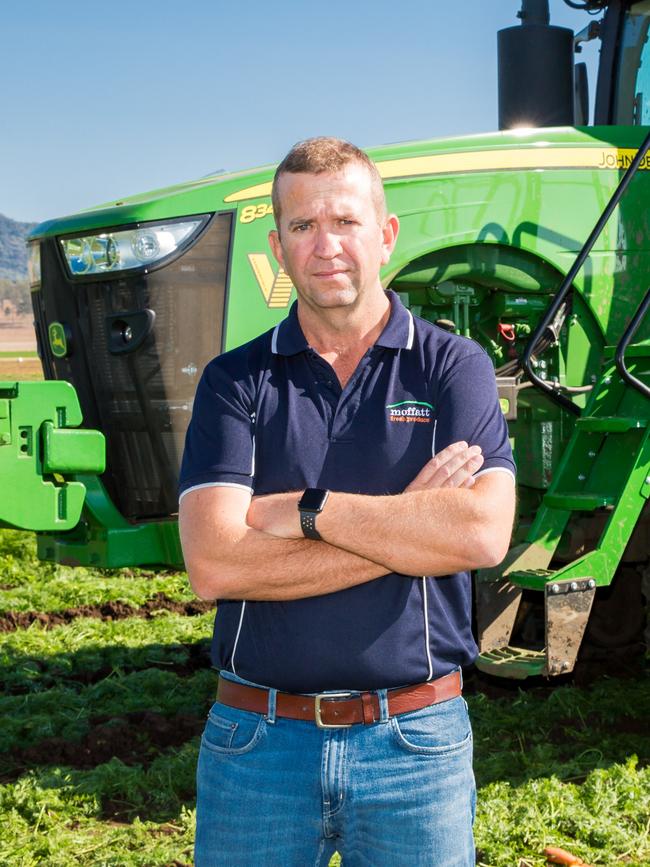Moffatt Fresh Produce at Tarome takes carrot farming to next level
Determination, innovation and collaboration has made this multimillion-dollar carrot farming business a world leader.

The jury might still be out on whether the old wife’s tale that eating a carrot helps you see in the dark stacks up scientifically.
But the clear vision of an Australian farming family that grows thousands of tonnes of the staple vegetable a year certainly can’t be understated.
Welcome to Tarome, in the picturesque Scenic Rim about an hour southwest of Brisbane in Queensland, where five generations of the Moffatt family have farmed the region’s sought-after nutrient-rich soils for almost a century.
From relatively humble beginnings, through a mix of determination, innovation and collaboration, they’ve built a horticulture business that has just not just survived the test of time, but thrived.
Moffatt Fresh Produce is now a multimillion-dollar powerhouse growing 28,000 tonnes of carrots, almost 10,000 tonnes of onions and five to six million bunches of celery annually.
It operates 365 days of the year – at times 24 hours a day – employs as many as 200 workers during peak periods and has expanded into four growing regions to ensure crucial year-round supply to its customers.
Steve Moffatt, a member of the family’s fourth generation, works alongside his brother, John, and cousin, Mitchell, as directors of the business.
He said he became involved almost “by default” almost 30 years ago as a farmer’s son straight out of school.
Steve has ridden the ups and downs of the industry over the decades, and overseen much change, including a switch from selling most produce through the wholesale market system to dealing directly with supermarkets and, more recently, initiating a targeted export program that is winning industry acclaim.
“Most of the business back in the day was done through the central markets,” Steve said. “The profitability in our product between us and the end-consumer is very tight, so in order to be able to continue to deliver to our customers at a reasonable price for their customers to enjoy, we have had to do a lot more direct selling.”
“That was a hard thing because our business was built on integrity, loyalty and honesty.
“We have had to not part company, but change the way we do business with some of our more traditional customers.
“It is fortunate we have got a direct link with our customer now.
“We can communicate with them seasonal events, crops being in abundance, crops being a little bit tight. It makes sense.”
ROTATION REGIMEN
THE Moffatts grow 98 per cent of their own produce. The main game is carrots.
The business farms about 800ha, which produces about 28,000 tonnes annually, which means getting the rotations right to ensure soil health and quality of produce is paramount.
They farm a mix of their own and leased land to mitigate challenges such as crop rotation.
While the business is headquartered in the Scenic Rim, it now operates across a diverse climatic and growing region including the Lockyer Valley, the Southern Downs and the Granite Belt to cater for that year-round supply.
“Obviously growing a winter vegetable in the middle of summer has its challenges, but how we mitigate that is moving around the clock to kinder climates in season and region,” Steve said.
“We’re a 365-day turnkey operation.
“We can’t afford interruptions to supply and nor do our customers expect it.”
The Scenic Rim and Lockyer Valley farms are about 100m above sea level, with operations rising to 400m above sea level and “cooler night-time temperatures and kinder daytime soil temperatures” on the Southern Downs and 1000m above sea level in the Granite Belt at Stanthorpe.
The Scenic Rim operates on an annual average rainfall of about 900mm, but Steve said it could vary widely.
He said that in January 2013 “we had most of that in one night” causing the removal of top soil and nutrition through leaching, but on the flip side in 2018 and 2019 the operation experienced severe drought.
Soils are mostly made up of rich alluvial creek soil flats, which means minimal inputs in terms of chemicals and fertiliser are required.
The bulk of production takes place in the Scenic Rim between June and December with spring “the ideal time to grow a carrot”.
Production in the Granite Belt ramps up from February to April with work in the Lockyer Valley and Southern Downs taking place on the “shoulder seasons”.

SIZE MATTERS
MOFFATT’S concentrates on growing a medium-sized carrot variety “ideal for roasting, easy to peel but can also be processed at a food-processing level”.
“The only time we vary our varieties is when we may have a weather event and we know that certain varieties might come in a little bit quicker,” Steve said.
“Sometimes we are hesitant to use them because of their potential to underperform.”
The carrots are grown on 750mm raised beds, with two lines of seed trickled down the centre of the rows by an airseeder promoting yields of about 50-60 tonnes/ha.
To ensure the quality of both their soil and product, the Moffatts work on growing carrots on certain country every three to five years, with either onions, celery, beetroot, lucerne or a cover crop grown in alternate years.
Irrigation plays a major role in the success of the business and Steve said after two years of drought, the business was heavily focused on minimising moisture losses.
“Our crops require irrigation generally on a five to seven-day basis, depending on the weather conditions at the time,” he said.
Irrigation methods range from overhead and lateral-moves sprinklers to centre pivots to two-inch (5cm) aluminium pipes or trickle tapes that remain in the crop during the season.
The business budgets on about 2.5 to 3.5 megalitres to water a hectare of carrots.
YOUTHFUL VIGOUR
STEVE said for carrots to reach their desired maturity took anywhere from 90 to 140 days. Harvest is carried out by self-propelled harvesters when the carrots are at the “shy of over-mature side”.
“We want to pick them reasonably young to keep them fresh, complementing shelf life whether it be on the supermarket shelf or in a container on sea for the next 24-30 days,” he said.
While the carrots are automatically graded and packed Steve said there were still some manual processes on the farm and in its packing facilities.
Due to growing “softer” varieties of onions more susceptible to machine harvest, onions are picked by hand.
“There has been a need for a push for more automation,” Steve said.
“These days we find ourselves working towards a lot less overtime due to the fact that we’ve got to mitigate penalty rates, which is a hard thing to do for an operation that runs 24/7.
“Part of the move to more automation has also been driven by volume.
“In order to produce the volume that we do, we need to be able to get it on and off the paddock as quickly as we can. That involves heavy artillery.”
QUICK DISPATCH
THE Moffatts work on the mantra that “we grow it, we pick it, we pack it, we freight it”.
They have their own freight operations for delivery throughout Queensland, but rely on third-party operators for interstate and sea freight.
Moffatt’s supplies most major supermarket chains up and down Australia’s east coast, as well as food services and prepacked salad manufacturers and the Sydney, Brisbane and Melbourne wholesale markets.
“We can deliver stock here that has been harvested this morning, processed by lunchtime, delivered into the supermarket shelves in Queensland tomorrow,” he said.
“And we can pretty much do the same thing with overnight transport into NSW and Sydney.”
The Moffatts have exported produce for almost a decade, with South East Asia, mainland Asia and the Middle East the key destinations.
They really ramped up their efforts about five years ago, through involvement in industry events and trade fairs in Hong Kong, Japan, Thailand, Singapore, the Middle East and Dubai, as well as reverse trade missions.
With exports, Steve said they placed a strong focus linking branding and quality. It is a move that has paid off with Moffatt named exporter of the year at the recent Hort Connections awards in Brisbane.
While exports aren’t the majority of the business it is something the Moffatts want to develop. Most produce is transported by sea, with the longest transit to the Middle East taking 21-24 days, and the quickest to South-East Asia taking 17 days.
Steve said the farm’s proximity to the Port of Brisbane gave them an advantage to growers in southern Australia in terms of transit times to South-East Asia and the Middle East.

FREIGHT HURDLES
STEVE said interruption to world freight lines over the past year was having an impact on the ability of the business to export as well as imposing additional costs.
“That is a real issue for us,” Steve said.
“We have seen increases in freight anywhere from $US800 to $2600 per box, so we’re talking about a 33 per cent increase.
“That is just this year and we don’t expect any reprieve.
“Our customers are very mindful of the fact that Australian produce is clean and green and promotes a healthy alternative to that of our international competitors, but that can only buy us so much time to the point where loyalty will be overridden by competition.”
Like most businesses in Australia, Moffatt’s has been affected by Covid.
It started with panic buying by consumers that “put a lot of pressure on our business to supply”.
“While Australia thought they were going to run out of toilet paper, they thought they were going to run out of carrots as well,” Steve said.
“After that settled down, we certainly saw the food services sector, the shipping lines being inactive, the airlines being inactive, the restaurant trade pretty much shutting down.
“It certainly hit the bottom line there was no doubt about that.
“Everyone was susceptible to that.
“We have seen a slight improvement. We are not there yet, but it is probably heading in the right direction.”
WASTE NOT
THE Moffatts are conscious of their environmental footprint, and try to use all their crop and minimise wastage.
Steve said certain supermarket customers sold secondary produce in a retail pack as “the ugly or the bad, or the cosmetically bad that still tastes good”.
“That has helped some of the food waste,” he said.
“We also look at recovering some waste by processing it into another format the food services chain can use.”
Moffatt’s has even started making its own carrot ice cream, which Steve described as “a hidden gem” and a “unique selling point”.
It debuted at a Scenic Rim Winter Harvest Festival about five years ago and was “a hit”.
“We just wanted to show the public there was something else you could do with a carrot,” he said. “I was brought up on steak and three veg every day of the year.”
What produce can’t be sold or processed, particularly in drier times, is usually fed to the farms’ 700 cattle.
The business has a focus on using lighter grades of plastic to reduce landfill and is “always looking at better alternatives for biodegradable or recycled products”.
Looking forward, Steve said he was happy with the carrot program and stability of prices.
“We sort of know our destiny from start to finish, minus the weather events that we might get along the way,” he said.
He was also excited about the prospects celery might offer the business.
“We can see that there is going to be some uplift there.
“Currently most is going into the supermarket business but we’d like to grow that more into export,” he said.
MORE
LABOUR HIRE WORKERS: NEW WORKPLACE SAFETY LAWS, FINES UP TO $270,000 IN VICTORIA
VITALHARVEST UNITHOLDERS VOTE TO SELL CITRUS COMPANY TO MACQUARIE FOR $357M



